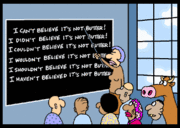Shells of Vocabulary
Helping Students Improve Their Vocabulary
Some of my online students struggle with their vocabulary knowledge. In order to improve your vocabulary skills it is a good idea to read a lot. Using context clues, or the words around an unknown word can give you clues as to what a new or unknown word means.
More VocabularyTips
To improve vocabulary it is good to try to find words that are synonyms for words you use often and then try to use them and weave them into your daily language use. Finding antonyms for such words also is an idea that can be helpful when looking to improve your vocabulary.
More Vocabulary Ideas
A good way to learn new words is to learn what the meanings are for root words. Other words with the same roots will have related meanings. Also learn the meanings of prefixes and suffixes. If you learn and know those, then you can look for other words with the same prefixes and suffixes and you will, in turn, also know what those words mean.
This is a great site that really has some good ideas about the importance of building your vocabulary and how to do it. This site also has information on using a dictionary, context clues, and more. http://academic.cuesta.edu/acasupp/AS/501.HTM It says that the way to improve your reading comprehension is through comprehension and that if you do not understand the words that you are reading you will have difficulty. Improving your vocabulary will help with speaking, writing and listening as well as with reading.
This site has an article about decoding. http://www.readingonline.org/articles/handbook/pressley/index.html The author stresses how you will not be able to read anything if you are not able to decode words. Before starting to read it is critical to know the sounds that the letters make, and to understand blends is a big part of this. It says in this article that word recognition skills are crucial for readers to be able to comprehend.
The Importance of Reading
There is probably no surer or sounder way to improve your reading permanently than by building a strong, precise vocabulary, and the only way to build your vocabulary is by reading a lot. In a precise vocabulary, every word is learned as a concept. You know its ancestry, its principal definition as well as several secondary definitions, its synonyms and the subtle differences among them, and its antonyms. Then, when you encounter it in your reading, this vast store of knowledge flashes before you, illuminating the sentence, the paragraph, and the idea the author is trying to convey (Pauk, p. 346).
References:
Pauk, Walter. How to Study in College. Fourth Edition. 1989.
Mohr, C., & Nist, S. Improving Vocabulary Skills. 1997.
Hennings, Dorothy. Vocabulary Growth. Strategies for College Word Study. 2001.
What's so magical about words?
Words, of course, are the coinage of communication, and they have far reaching effects (Pauk, 1974).
Labarge and Samuels (1974) discovered that you need fluency in order to read. They figured out that it does not matter if you can just decode or read words properly. If you are able to fluently recognize words it will free your brain up for comprehension, but just because you can say the words correctly does not guarantee understanding.
Tan and Nicolson (1997) found that fluent word recognition is the key to reading comprehension. There had been previous studies on this, and this studied confirmed those. Research on reading and comprehension is an ongoing process and more and more is being discovered from such findings.

